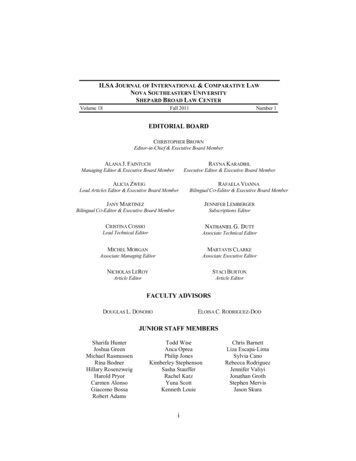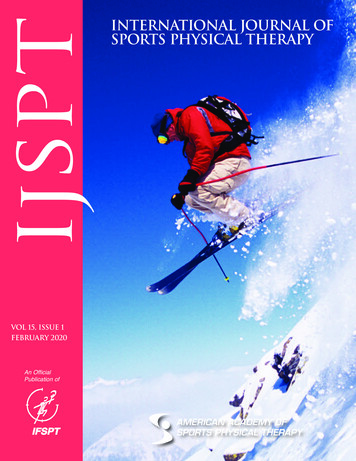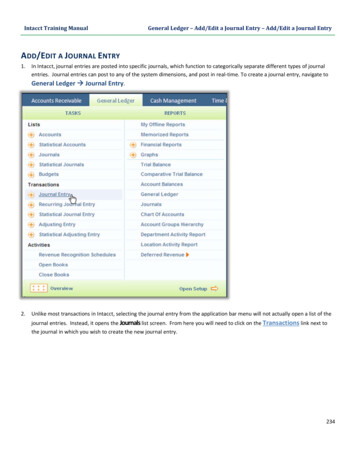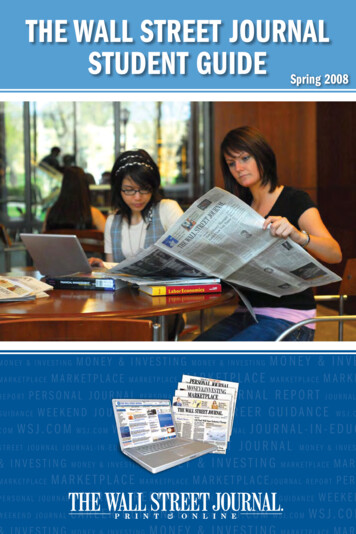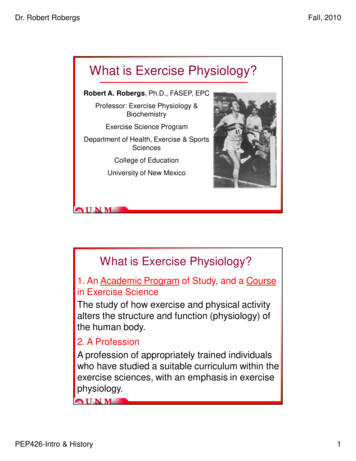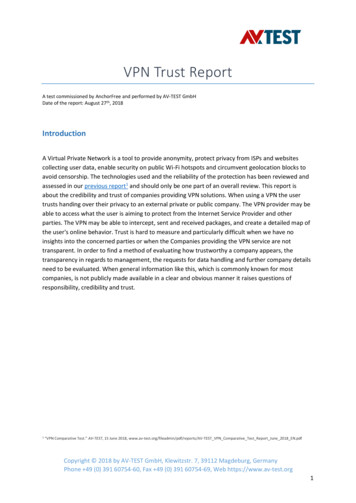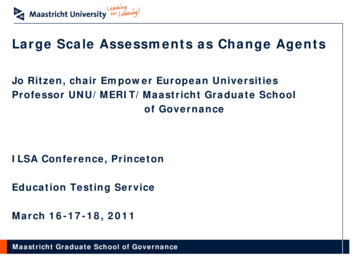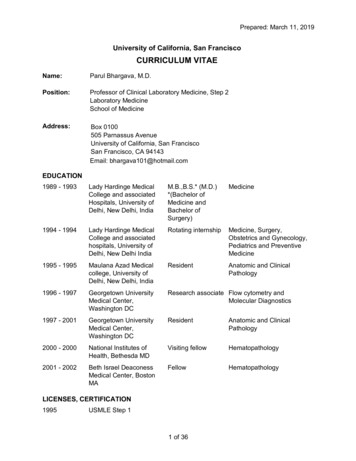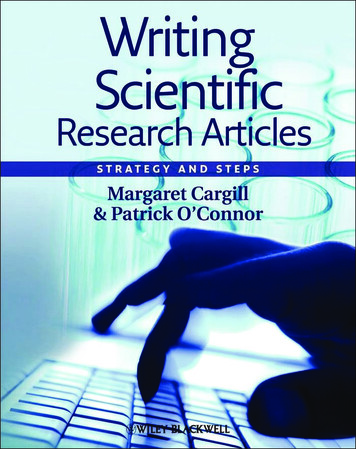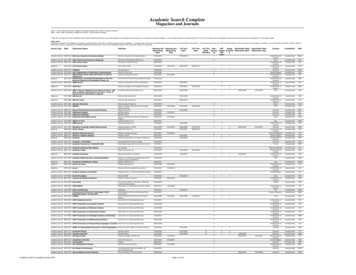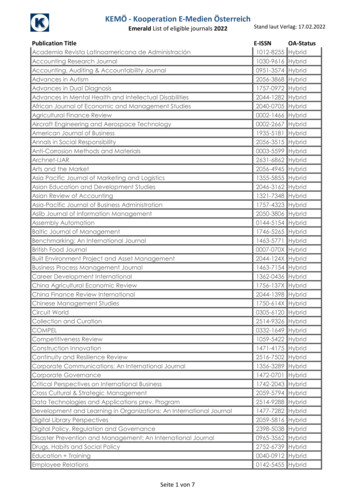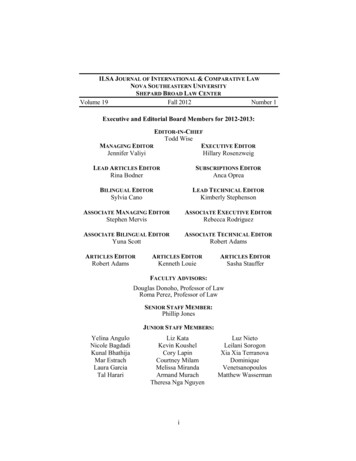
Transcription
ILSA JOURNAL OF INTERNATIONAL & COMPARATIVE LAWNOVA SOUTHEASTERN UNIVERSITYSHEPARD BROAD LAW CENTERVolume 19Fall 2012Number 1Executive and Editorial Board Members for 2012-2013:EDITOR-IN-CHIEFTodd WiseEXECUTIVE EDITORMANAGING EDITORJennifer ValiyiHillary RosenzweigLEAD ARTICLES EDITORRina BodnerSUBSCRIPTIONS EDITORAnca OpreaBILINGUAL EDITORSylvia CanoLEAD TECHNICAL EDITORKimberly StephensonASSOCIATE MANAGING EDITORStephen MervisASSOCIATE EXECUTIVE EDITORRebecca RodriguezASSOCIATE BILINGUAL EDITORYuna ScottASSOCIATE TECHNICAL EDITORRobert AdamsARTICLES EDITORRobert AdamsARTICLES EDITORKenneth LouieARTICLES EDITORSasha StaufferFACULTY ADVISORS:Douglas Donoho, Professor of LawRoma Perez, Professor of LawSENIOR STAFF MEMBER:Phillip JonesJUNIOR STAFF MEMBERS:Yelina AnguloNicole BagdadiKunal BhathijaMar EstrachLaura GarciaTal HarariLiz KataKevin KoushelCory LapinCourtney MilamMelissa MirandaArmand MurachTheresa Nga NguyeniLuz NietoLeilani SorogonXia Xia TerranovaDominiqueVenetsanopoulosMatthew Wasserman
NOVA SOUTHEASTERN UNIVERSITYSHEPARD BROAD LAW CENTERADMINISTRATIONAthornia Steele, B.A., J.D., Dean of the Law School & Professor of LawLeslie Larkin Cooney, B.S., J.D., Associate Dean for Academic Affairs &Professor of LawJosh Metz, B.S., B.S., B.A., C.P.A., Director of Finance and AdministrationCatherine Arcabascio, B.A., J.D., Associate Dean for International, Onlineand Graduate Programs and Professor of LawJennifer McIntyre, B. S., M.S., Assistant Dean for Online ProgramsJanet Mosseri, B.S., J.D., Associate Director for Student AffairsLynn Acosta, B.A., M.S., Assistant Dean for Student ServicesWilliam Perez, B.A., Assistant Dean for AdmissionsLinda F. Harrison, B.A., J.D., Associate Dean, Critical Skills Program &Associate Professor of LawBernadette Carnegie Baugh, B.S., M.S.M.F.T., Administrative Director,Critical Skills ProgramNancy Kelly Sanguigni, B.S., M.B.A., Assistant Dean for Clinical ProgramsRobert Levine, B.S., J.D. Assistant Dean of Career Development, & AdjunctProfessorJennifer Jarema, B.A., M.S., Director of Communication and, Publications &Special EventsDoug Kruse, B.A., M.S., Director of DevelopmentEric Young, B.A., M.L.S., J.D., Director Law Library & Technology Center,Head of Information Services and Assistant Professor of LawFACULTYJohn B. Anderson, B.A., J.D., LL.M., Distinguished Visiting Professor ofLawCatherine Arcabascio, B.A., J.D., Associate Dean, International Programsand Professor of LawTimothy Arcaro, B.S., J.D., Academic Director AAMPLE and OnlinePrograms, and Professor of LawHeather Baxter, B.A., J.D., Assistant Professor of LawBrion Blackwelder, B.S., J.D., Director, Children & Families Clinic &Associate Professor of LawRonald Benton Brown, B.S.M.E., J.D., LL.M., Professor of LawRandolph Braccialarghe, B.A., J.D., Professor of LawBarbara Britzke, M.A.T., J.D., LL. M, Critical Skills Program InstructorJohnny C. Burris, B.G.S., J.D., LL.M., Professor of LawMarilyn Cane, B.A., J.D., Professor of Lawii
Kathy Cerminara, B.S., J.D., LL.M., Professor of LawMeg Chandelle, B.S., M.B.A., J.D., Director of Advanced Lawyering Skills &Values & Adjunct Professor of LawDavid R. Cleveland, B.A., J.D., Associate Professor of LawPhyllis G. Coleman, B.S., M.Ed., J.D., Professor of LawLeslie Larkin Cooney, B.S., J.D., Associate Dean of Academic Affairs andProfessor of LawJane Ellen Cross, B.A., J.D., Director of Caribbean Law Programs andAssociate Professor of LawDebra Moss Curtis, B.A., J.D., Professor of LawMichael J. Dale, B.A., J.D., Professor of LawMark Dobson, B.A., J.D., LL.M., Professor of LawDouglas Lee Donoho, B.A., J.D., LL.M., Professor of LawOlympia Duhart, B.A., J.D., Associate Professor of LawLynn A. Epstein, B.S., J.D., Professor of LawMichael Flynn, B.A., J.D., Professor of LawAmanda Foster, B.A., J.D., Associate Professor of LawPearl Goldman, B.C.L., M. Phil., LL.B., J.D., LL.M., Professor of LawColleen Grady, M.S., Ed., J.D., Critical Skills Program InstructorRobert Gregg, J.D., Critical Skills Program InstructorJoseph M. Grohman, B.A., M.A., J.D., Professor of LawRichard Grosso, B.S., J.D., Director, Environmental & Land Use LawClinic and Associate Professor of LawGwen Thayer Handelman, B.A., J.D., Scholar in ResidenceJoseph D. Harbaugh, B.S., J.D., LL.B., LL.M., Dean Emeritus & Professorof LawLinda F. Harrison, B.A., J.D., Associate Dean, Critical Skills Program &Associate Professor of LawJoseph Hnylka, B.A., J.D., Assistant Professor of LawAreto Imoukhuede, B. A., J.D., Associate Professor of LawRobert M. Jarvis, B.A., J.D., LL.M., Professor of LawAlicia Jackson, M.P.A., J.D., Critical Skills Program InstructorJudith Karp, B.A., M.L.S., J.D., Professor of LawShahabudeen Khan, B.S., J.D., Assistant Professor of LawIshaq Kundawala, B.A., J.D., Associate Professor of LawP. Camille Lamar, B.A., J.D., Associate Professor of LawElena Langan, B.A., J.D., Director of First Year LSV Program andAssociate Professor of LawRobert C. Levine, B.S., J.D., Assistant Dean, Career Services & AdjunctProfessor of LawJames B. Levy, B.A., J.D., Associate Professor of LawKenneth Lewis, B.A., J.D., Assistant Professor of LawDonna Litman, A.B., J.D., Professor of LawElena Marty-Nelson, B.A., J.D., LL.M., Professor of LawMichael R. Masinter, B.A., J.D., Professor of LawJani E. Maurer, B.A., J.D., Professor of LawHoward Messing, A.B., J.D., Professor Emeritus of LawJoel A. Mintz, B.A., J.D., LL.M., J.S.D., Professor of LawHugh Mundy, B.A., J.D., Assistant Professor of LawHeddy Muransky, B.A., M. Ed., J.D., Critical Skills Program Instructoriii
Timothy A. O’Brien, B.A., M.A., J.D., Distinguished Visiting Professor ofLawRoma Perez, B.A., J.D., Associate Professor of LawPouncy, Charles, B.A., J.D., LL.M., Distinguished Visiting Professor ofLawPatricia Murphy Propheter, M.A. Ed., J.D., Critical Skills Program InstructorRodney Rawls, J.D., LL. M., Critical Skills Program InstructorGail Levin Richmond, A.B., M.B.A., J.D., Professor of LawMichael L. Richmond, A.B., M.S.L.S., J.D., Professor of LawEloisa C. Rodriguez-Dod, B.B.A., M.B.A., J.D., Professor of LawBruce S. Rogow, B.B.A., J.D., Professor of LawMarc Rohr, B.A., J.D., Professor of LawRaul Ruiz, B.A., J.D., Critical Skills Program InstructorJohn Sanchez, B.A., J.D., LL.M., Professor of LawFlorence Shu-Acquaye, LL.B., LL.M., J.S.M., J.S.D., Professor of LawCharlene Smith, B.A, M.A., J.D., LL.M., Professor of LawAthornia Steele, J.D. Dean and Professor of LawMichele Struffolino, M.A Ed., JD., Assistant Professor of LawFran L. Tetunic, B.A., J.D., Director, Alternative Dispute Resolution Clinic& Associate Professor of LawKathryn Webber, B.A., J.D., Assistant Professor of LawJames D. Wilets, B.A., M.A., J.D., Professor of LawTania Williams, B.A., J.D., LL. M., Critical Skills Program InstructorSteven Wisotsky, B.A., J.D., LL.M., Professor of LawEric Young, B.A., M.L.S., J.D. Assistant Dean for Law Library andTechnology Services/Assistant Professor of LawADJUNCT FACULTYScott Atherton, B.S., J.D.Ross Baer, B.A., J.D.Steve Ballinger, B.A., J.D.Courtney Bannan-Strader, B.S., J.D.Roshawn Banks, B.S., J.D.Lorna Banister, B.S., J.D.Marilyn Batista-McNamara, B.S.,J.D.Leyza Blanco, B.A., J.D.Gabrielle Bouza, B.S., J.D.Mark Bromley, B.S., J.D.Dale A. Bruschi, B.S., J.D.Robert Campbell, B.A., J.D., M.P.H.,Ph.D.Lydia Cannizzo, B.H.S., J.D.Meg Chandelle, B.S., M.B.A., J.D.ivNeil Karadbil, B.A., J.D.Ken Kugler, B.A., J.D.Warren Kwavnick, B.C., J.D.Barbara Landau, B.A., J.D., LL.M.Steven Leigh, B.S., M.S., J.D., Ph. D.Allan M. Lerner, B.A., J.D.Robert Levine, B.S., J.D.James Lewis, B.A., J.D.Juan Lopez-Campillo, B.A., J.D.,LL.M.Rochelle Marcus, B.S., M.ED., J.D.Lisa A. McNeils, B.A., J.D.Catherine M. Michael, B.A., J.D.Elena R. Minicucci, B.A., J.D.Seema Mohapatra Reddy, B.A.,M.P.H.,
Kenneth Morgan, Jr., B.A., J.D.Alberto Moris, B.A., J.D.Gerald Morris, B.A., J.D.Charles Morton, B.A., J.D.John Napolitano, B.A., J.D.Matthew Nelles, B.S., J.D.Alice Nelson, B.A., M.S.W., J.D.Paul A. Nidich, B.A., J.D., LL.M.William Nortman, B.A., J.D.Mark Nurik, B.A., J.D.Elizabeth Pendo, B.A., J.D.Laura Pincus, B.A., M.A., J.D.Gary A. Poliakoff, B.S., J.D.Vanessa Prieto, B.A., J.D.Rachael Ricci, B.A., J.D.Israel Reyes, A.A., B.S., J.D.Rebecca Rich, A.B., J.D., M.S.Christine Rickard, B.A., J.D.H. John Rizvi, B.S., J.D.Michael Rocque, B.A., J.D.Jose A. Rodriguez-Dod, B.S., J.D.Denise Roland, B.A. J.D.Jon Rosenthal, B.A., J.D.Diana Santa Maria, B.A., J.D.Jessica Santiago, B.A., J.D.Philip G. Schlissel, B.A., J.D.Carl Schoeppl, B.S., J.D.Adam Schulman, B.A., M.S., Ph.D.Robert Schwartz, B.A., J.D.Neal Shniderman, B.A., J.D.Jodi Siegel, B.A., J.D.Samuel Smargon, Ph.D., J.D.Scott Smiley, B.S., J.D.Mindy Solomon, B.S., J.D.Richard Stone, B.A., J.D.Frank Terzo, B.A., J.D.Debbie Thaler, B.A., J.D.Ellen S. Tilles, B.A., M.S.W., Ed.S.,J.D.Damian Thomas, B.B.A., J.D.Emilie Tracy, B.A., J.D.Rhonda Wallach, B.S., J.D.Daniel S. Weinger, B.B.A., J.D.Jason Weiss, B.A., J.D.Michele Chang, B.A., J.D., M.H.A.Judith Chorlog, B.S., J.D.Howard Citron, B.S., J.D.Steven M. Collard, B.A., M.Ed.Michael Constantino, B.A., J.D.Christopher Crane, B.S., J.D.Charles Curtis, B.S., J.D.Arthur Ted Daus, B.A., J.D.Morton A. Diamond, B.A., M.D.Robert F. Diaz, A.A., B.A., J.D.Ken S. Direktor, B.A., J.D.Susan Dubow, B.S.Rebecca Feinberg, B.A., J.D.Jane Fishman, B.A., J.D.Luis Font, J.D.Rex J. Ford, B.S., J.D.Steve Friedland, B.A., J. D., LL. M.,J.S.D.John A. Frusciante, B.A., M.S., J.DMyrna Galligano, B.A., J.D.Jason Glusman, B.A., J.D.Stuart Gold, B.A., J.D.Adam S. Goldberg, B.S., J.D., LL.M.Anthony Gonzalez, B.A., J.D.Robert C. Grosz, B.A., M.S., Ed.D.Tonja Haddad, B.A., J.D.Ross Hartog, B.S., J.D.Robert Hartsell, B.A., J.D.Ann Hesford, B.A., J.D.Douglas F. Hoffman, B.S., B.A.,J.D.Alfred Horowitz, B.A., J.D., LL.M.Julie Hough, B.A., J.D.Jacqueline Howe, B.A., J.D.Cynthia Imperato, B.S., M.S., J.D.William Isenberg, B.A., J.D.Yasmin Jacob, B.A., J.D.Judith Jarvis, B.A., J.D.Linnea Johnson, B.A., J.D.Nick Jovanovich, B.S., J.D., LL.MNorman Kaplan, B.S., J.D., LL.M.Daniel L. Kaufman, B.S., J.D.v
Phyllis Kotey, B.A., J.D., M.A.Pamela Krauss, B.S., M.S., J.D.Ira Kurzban, B.S., J.D.Harry Dohn Williams, B.A., J.D.Camille Worsnop, B.S., J.D., LL.MBruce Zimet, B.A., J.D.LIBRARY STAFFEric Young, B.A., M.L.S., J.D. Assistant Dean for Law Library andTechnology Services and Assistant Professor of LawFrank Novak, B.A., J.D., Director of Network ServicesStephan Sobchak, B.S., Technology DevelopmentManagerJason Rosenberg, B.A., M.B.A., M.I.S, Information Systems AdmCarol Yecies, B.A., J.D., Associate Director for Reference ServicesBecka Rich, B.A., J.D., M.S. Senior Associate Director of Law Libraryand Technology Center and Adjunct Professor of LawMary Paige Smith, B.A., M.L.S., Associate Law Library Director forTechnical ServicesAngie Stramiello, B.A., M.L.S., Reference LibrarianAlison Rosenberg, B.A., J.D., Reference/Electronic Services LibrarianStephanie Hess, B.A., M.L.I.S., Assistant Head of Technical Services,Acquisitions & Serialsvi
EDITOR’S NOTESadly, 2012 has left our world with many unanswered questions and greatinstability. The elections in the United States were fraught with platitudesabout hope but bereft of meaningful solutions. Our world stands at the edgeof a dangerous precipice—the Arab Spring may be in its historical infancy,but it can be debated whether this is the democracy that President Obamaenvisioned when he delivered his speech in Cairo in 2009. Economicindicators leave us searching for answers in Greece, Spain, and the U.S.where youth unemployment numbers continue to rise. Despite any numberof issues, the ILSA Journal of International & Comparative Law asked ouracademic contributors to discuss one necessity—water. Two differentpieces provide legal perspectives on how this human necessity can (orperhaps cannot) become a legally enforceable global concern. Equally, asociological perspective discusses not only the biological necessity of waterbut also how water as a commodity can serve to oppress thedisenfranchised.Assistant Professor Rhett B. Larson, in his “Water, Worship, and Wisdom:Indigenous Traditional Ecological Knowledge and the Human Right toWater” has recognized the legal impediment of access to water as a basichuman right. However, Professor Larson posits that indigenous peoplesmay protect their water resources through claims of international humanrights. Professor Larson advances the notion that policy-makers must lookto religion and culture to protect the most basic human necessities.Professor Nan Palmer Ph.D. ACSW/LMSW, in “Water Adequacy as anEssential Element for Empowering People,” brought a biological andsociological perspective to the water discussion. Professor Palmer painteda bleak picture of the psychological pitfalls of water deprivation, includingbut not limited to short-term memory loss, confusion, and anger. Further,her portrayal of withholding water from the marginalized, impoverished,and disenfranchised populations was sobering. Water deprivation has beenused as a tool of oppression in cases of domestic abuse and political terror,something that might have escaped our readership.Professor Doug Donoho, in his “Some Critical Thinking About a HumanRight to Water,” discussed in great depth that our global population willlikely be nine billion in the next forty years.Implicit in ProfessorDonoho’s staggering population statistics is the greater need for sufficientwater access. However, Professor Donoho asserted that no matter howessential a human need, this does not establish a legally enforceable right towater. Though Professor Donoho was skeptical about a global, legallyvii
enforceable right to water, he does hope for a collective moral obligation inthe future.Additionally, this edition focuses on student contributors. Our studentcontributors inherit this complex world, and it is incumbent upon them tomeaningfully participate in the legal discussion.DominiqueVenetsanopohlos, in her “The Trillion-Dollar Question: Can Greece beSaved?,” discussed in detail how Greece fell off the fiscal cliff. Further,Ms. Venetsanopohlos conducted a thorough analysis of the efficacy ofGreece’s potential departure from the EU. Tal Harari channeled GeorgeOrwell in her “Facebook Frenzy Around the World: The DifferentImplications Facebook has on Law Students, Lawyers, and Judges.” Ms.Harari discussed how Facebook can control bar admission for law students.Lastly, the winning Memorial Briefs and Compromis from the 2012 PhilipC. Jessup International Moot Court Competition complete this volume.On behalf of the ILSA Journal of International & Comparative Law, Iwould like to thank the remarkable scholars who contributed to the issue.We are grateful to them for allowing us to edit and subsequently publishyears of collective research.A Journal is a sum of its parts. I am extremely lucky to have an ExecutiveEditorial Board who spent all hours producing this product for which weare all proud: Hillary Rosenzweig, Jennifer Valiyi, Rina Feld, and SylviaCano are to be commended for their commitment. Further, the rest of ourSenior Staff and Junior Staff committed to this process from its inceptionand never looked back. Additionally, our faculty advisors, Professor DougDonoho and Professor Roma Perez were wonderful mentors.I would personally like to thank my own family for their love, support, andfor allowing me to go on this intellectual adventure. My sincere hope isthat our readership finds this work as socially important as the Journaldoes.Todd WiseEditor-in-Chief, 2012–2013viii
ILSA JOURNAL OF INTERNATIONAL & COMPARATIVE LAWNOVA SOUTHEASTERN UNIVERSITYSHEPARD BROAD LAW CENTERVolume 19Fall 2012Number 1TABLE OF CONTENTSFacebook Frenzy Around the World:The Different Implications Facebookhas on Law Students, Lawyers, and Judges Tal Harari1Water Adequacy as an Essential Elementfor Empowering People . Nan Palmer Ph.D. ACSW/LMSW31Water, Worship, and Wisdom: IndigenousTraditional Ecological Knowledge andthe Human Right to Water . Rhett B. Larson43The Trillion-Dollar Question: Can Greecebe Saved?. Dominique Venetsanopoulos69Some Critical Thinking About a HumanRight to Water . Doug Donoho912012 PHILIP C. JESSUP INTERNATIONAL LAW MOOTCOURT COMPETITION DISTINGUISHED BRIEFSJessup Compromis117Memorial for ApplicantNational Law School of India University (India)143Memorial for RespondentColumbia Law School (USA)191ix
FACEBOOK FRENZY AROUND THE WORLD: THEDIFFERENT IMPLICATIONS FACEBOOK HAS ONLAW STUDENTS, LAWYERS, AND JUDGESTal Harari*I.II.III.INTRODUCTION . 1THE FACEBOOK PHENOMENON . 3THE BEGINNING OF THE END: FACEBOOK AFFECTING LAWSTUDENTS. 5A. The Florida Bar as an Example . 6B. Employment Opportunities. 9IV. WHEN THE BALL KEEPS ROLLING: FACEBOOK AFFECTINGLAWYERS . 12A. The Right to Privacy and the Right to Free Speech . 141. Public Sector Employment . 142. Private Sector Employment . 16B. Model Rules of Professional Conduct . 17V.IT’S NOT OVER YET: FACEBOOK AFFECTING JUDGES . 21VI. INTERNATIONAL VIEWS ON SOCIAL NETWORKING IN THE LEGALFIELD . 24A. A Canadian Outlook. 27VII. CONCLUSION . 29I. INTRODUCTIONOver the last decade the use of social networking sites has swept thenation by providing users with the ability to “interact, connect, reconnect,communicate, and collaborate in various ways—such as through audio,words, pictures, or video—with friends, family, acquaintances, professionalcolleagues, and others.”1 Consequently, this new interactive way tocommunicate with others by posting personal information about one’s selfon the Internet has made for a substantial impact on individuals working inthe legal profession.2 “As the relationship between social networking and*Tal Harari is currently a second year law student at Nova Southeastern University. Sheholds a Bachelor of Arts degree in Sociology and Judaic Studies from the University of Miami. Shewould like to thank her family and friends for their continuous and incredible support. Additionally, shewould like to thank the members of ILSA Journal of International and Comparative Law for their hardwork and Professor Olympia Duhart for her tremendous support, encouragement, and guidance.1.Kathleen Elliot Vinson, The Blurred Boundaries of Social Networking in the Legal Field:Just “Face” It, 41 U. MEM. L. REV. 355, 358 (2010).2.Id. at 356.
2ILSA Journal of International & Comparative Law[Vol. 19:1members of the legal community continues to evolve, the boundariesbetween personal and professional worlds are often blurred, creating legaland ethical minefields.”3 Although the use of social networking offers anarray of benefits for members of the legal community, it poses a huge riskfor those who do not modify their use to comply with the ethical standardsof the legal profession.4 Individuals enter the legal community the momentthey enter law school, and from that very moment they must be cautiousand aware of the negative implications social networking sites can have ontheir careers. Individuals born and raised in the Internet age are the oneswho face the most risk since the use of social networking is second naturefor those individuals.In 2007, “60% of Internet users report[ed] that they [were] not worriedabout how much information about them is available online.”5 One canonly imagine how difficult it would be to alert Internet users in 2012 of theconsequences of their actions on social networking sites. This articlefocuses on alerting individuals entering the legal world of the implicationsthat one of the most popular social networking sites, Facebook, can have ontheir careers.Part I of this article will address the different ways in which Facebookaffects law students, lawyers, and judges in the State of Florida as theywork their way through the legal field. Part II of this Article will provide abrief history of the growth of Facebook and all the site has to offer severalmillion users worldwide.6 Part III will examine the two most importantways in which Facebook can impact the life of a law student.Part III will first discuss Facebook’s effect on a law student’sadmission to the Florida Bar. Next, Part III will address the negativeimpact Facebook has on future employment opportunities for law students.Part IV will then discuss the new risks that Facebook presents once lawstudents transition into practicing attorneys.Part IV will first analyze privacy right issues and free speech issuesthat attorneys face when using Facebook. It will distinguish the ways inwhich attorneys can assert those fundamental constitutional rights,depending on whether the attorney works for the state government in thepublic sector, or whether the attorney works for a firm in the private sector.The second half of part IV will discuss how the use of Facebook has made3.Id. at 357.4.Id.5.Dina Epstein, Have I Been Googled?: Character and Fitness in the Age of Google,Facebook, and Youtube, 21 GEO. J. LEGAL ETHICS 715, 724 (2008).6.Vinson, supra note 1, at 361.
2012]Harari3it more difficult for attorneys to adhere to the Model Rules of ProfessionalConduct, and will specify some of the rules attorneys should be aware of.Part V of the article will addresses the implications Facebook has onjudges in Florida; specifically, there are issues that arise when judgesbecome Facebook friends with practicing attorneys. Part VI of the articlewill expand beyond the scope of Florida and briefly discuss theinternational view on the use of social networking sites in the legalprofession and practice. Part VI will focus on the Canadian legalprofession’s outlook on the use of Facebook by lawyers in Canada.Part VII of the article will offer advice to members of the legalcommunity on how to balance their use of Facebook with their legal careersso as to avoid any negative repercussions.II. THE FACEBOOK PHENOMENONFrom all the social media sites available to Internet users, such asMySpace, LinkedIn, and Twitter,7 Facebook has by far become the mostpopular site, with currently over 500 million users.8 Founder and ChiefExecutive Officer of Facebook, Mark Zuckerberg, initially launched the sitein 20049 with a “mission [] ‘to share and make the world more open andconnected.’”10 The site allowed for college students to create pages onwhich they could list information about their personal lives, including theirname, age, sex, relationship status, employment history, and education.11 In2005, the site expanded to include high school students, and by 2006,anyone over the age of thirteen could become a Facebook member.12Facebook’s impact is not solely concentrated in the United States but ratherit has gone global.13 Facebook has been “[t]ranslated into more thanseventy languages, with 70% of user access occurring outside of the UnitedStates.”14Facebook members can utilize the site to “view and post content onother users’ profiles, send messages, establish and join networks and7.Vinson, supra note 1, at 359.8.Id. at 361.9.Id.10. .com/facebook?v info (last visited July 29, 2012)).availableat11. Amy-Kate Roedger, Commentary, Wall Posts, Status Updates, and the Bar: How SocialNetworking Impacts Character and Fitness Requirements, 35 J. LEGAL PROF. 145, 145 (2010).12.Vinson, supra note 1, at 361.13. See Karen Tanenbaum, Note, Should the Default be “Social”? Canada’s PushbackAgainst Over-Sharing By Facebook, 40 GA. J. INT’L & COMP. L. 275, 277 (2011).14.Id.
4ILSA Journal of International & Comparative Law[Vol. 19:1groups, invite members to events, and search for other members.”15 Inorder to connect, users must first send friend requests to other Facebookmembers who then may accept the request before being able to view andpost content on the other’s profile page.16 Once the users become“Facebook friends,” they can look through each other’s pictures, “tag” oneanother in other users’ photos, write messages on each other’s “wall,” andget each other’s attention by using the “poking” feature.17 They can evenpost article links18 and YouTube clips on each other’s page. Friends alsoleave “comments” or “like” certain photos and wall posts that appear oneach other’s profile page.Facebook can be used as a means to present your thoughts and feelingson the Internet; “[a]dditionally, Facebook users can maintain an ongoingcommentary about their own emotional and psychological state byconstantly updating their Facebook ‘status.’”19 For example, a user canvent to the world about her horrible job by updating her status to thefollowing: ‘what an awful day at work! In much need of cocktail!’As Facebook continued to expand, so did its features such as theamount of personal information available about its users.20 These settingsexpose the details of a member’s online activity. Facebook also allowsusers to protect themselves by utilizing privacy settings to regulate whatpersonal information is visible to the public.21 For example, users canrestrict anyone from finding them on Facebook, prevent anyone who is nottheir “friend” from viewing any of their wall posts and pictures, or evenrestrict their actual “friends” from posting any content on their page.22Unfortunately, individuals who grew up with Facebook “are less likelyto question the appropriateness of their conduct because of a ‘reduced senseof personal privacy.’”23 Consequently, young attorneys are unaware of therisks that they are exposed to when allowing the public to view their15.Id. at 360–61.16. Angela O’Brien, Are Attorneys and Judges One Tweet, Blog, or Friend Request AwayFrom Facing a Disciplinary Committee?, 11 LOY. J. PUB. INT. L. 511, 513 (2010).17. Samuel Vincent Jones, Judges, Friends, and Facebook: The Ethics of Prohibition, 24GEO. J. LEGAL ETHICS 281, 284 (2011).18. Jonathan Sabin, Comment, Every Click You Make: How the Proposed Disclosure of LawStudents’ Online Identities Violates Their First Amendment Right to Free Association, 17 J. L. & POL’Y699, 708 (2009).19.Id.20.Vinson, supra note 1, at 369.21.Id. at 367.22.Id. at 368.23.O’Brien, supra note 16, at 529.
2012]Harari5personal information, and the repercussions it might have on their careers.Although Facebook offers privacy settings for users to control what otherssee, it is not an absolute shield against exposing information thatindividuals may not want the world to see. Even if an inappropriate post orpicture is deleted from Facebook, it does not mean that it is not still lurkingon the Internet.24 For that very reason, members of the legal communitymust be extremely cautious with how they utilize Facebook and be aware ofthe negative implications it might have on their futures.III. THE BEGINNING OF THE END: FACEBOOK AFFECTING LAW STUDENTSJust a few years ago, a law student’s chief concerns were succeedingin the classroom and passing the state Bar exam. In 2012, times havechanged. Although Facebook can benefit those law students who utilize itin a productive manner, such as a networking tool with other lawyers,25Facebook can also cause students substantial harm. “The use of socialnetworking sites, [specifically Facebook] combined with the permanenceand accessibility of the Internet, raises issues about the content that lawstudents post on the Internet, as well as the character they display in doingso.”26 Even though students may filter their Facebook pages and deleteinappropriate pictures, comments, or posts, there is still the possibility thatthe public will be able to access what has been deleted.27 Consequently,one of the first things students in today’s generation hear during law schoolorientation is to be wary of their facebook posts.This vital warning ensures that law students realize that “their legalcareer and their reputations begin in law school, not when they graduate.”28Facebook can thus have negative implications on their future.29 As such,law students are well-advised to remove any and all inappropriate posts orpictures from their respective Facebook accounts.30 When a student actsinappropriately by posting statuses, comments, and pictures involvingdrugs, alcohol, and sex,31 it can be “interpreted to mean that [the] individualcannot be trusted with confidential matters, or that he or she lacks the24.Vinson, supra note 1, at 376.25.Id. at 376.26.Roedger, supra note 11, at 145.27.Vinson, supra note 1, at 376.28.Id. at 381–82.29.Id. at 376.30.See Roedger, supra note 11, at 151.31.Vinson, supra note 1, at 377.
6ILSA Journal of International & Comparative Law[Vol. 19:1proper judgment to make sophisticated legal decisions.”32 Therefore,admonishments given to law students are proper because of the potentialdamaging effects on their future admission to the Bar.33A. The Florida Bar as an ExampleStudents must go through a crucial application process before they canbe admitted to the Florida Bar. For years, American society has beenskeptical of the legal profession and its reputation.34 To address thissocietal concern about individuals admitted to work in the legal profession,the Ame
i ILSA JOURNAL OF INTERNATIONAL & COMPARATIVE LAW NOVA SOUTHEASTERN UNIVERSITY SHEPARD BROAD LAW CENTER Volume 19 Fall 2012 Number 1 Executive and Editorial Board Members for 2012-2013: EDITOR-IN-CHIEF Todd Wise MANAGING EDITOR Jennifer Valiyi EXECUTIVE EDITOR Hillary Rosenzweig LEAD ARTICLES EDITOR Rina Bodner
